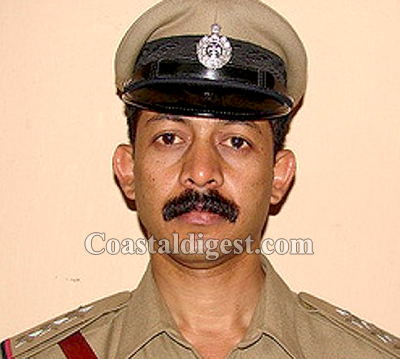Mangaluru, Jul 7: In the second case of suicide by a police officer in barely two days, M K?Ganapathi, Deputy Superintendent of Police (DySP) attached to the office of the Inspector General of Police?(Western Range) in Mangaluru ended his life in Madikeri on Thursday.

However, Mr. Ganapathy, while speaking to the TV channel in Madikeri in the afternoon, accused Minister K.J. George and senior officers in the department of mental harassment. He had even cited a threat to his life in the statement, and bemoaned that despite having served with honesty, he was being hounded.
According to sources, Ganapathi went to Madikeri from Mangaluru on Thursday morning and rented a room in Vinayak Lodge near the KSRTC?bus stand. Around noon, he left the lodge in full uniform and went to a private local TV channel studio and gave an interview. During the interview, Ganapathi reportedly said that ADGP?A?M?Prasad, DIG?Pranab Mohanty and former home minister K?J?George were harassing him and he faced a life threat from them.
Later, he returned to the lodge and hung himself from a ceiling fan, still in uniform.
The incident came to light only after the police went to the lodge, but it is unclear how they found out about the suicide. He reportedly left a suicide note, in which he is said to have blamed senior politicians and senior police officers for the extreme step.
Mr. Ganapathy had a long tenure serving in various capacities in the Bengaluru city police, but it was also marked by controversies with the official accused of being involved in multiple encounters and suspended many times during the last six years.
He had served as an inspector at Yeshwantpur, Rajagopal Nagar and Madiwala police stations and had killed a rowdy sheeter, Prashanth alias Pacchi (20), in September 2010 in an encounter.
With the youth's mother taking up a legal fight saying her son was murdered, Mr. Ganapathy was suspended and a departmental inquiry later exonerated him.
He was again suspended in 2014 when he was inspector of Madiwala, when there were allegations that he had misused recovered property.
Due to these multiple inquiries and suspensions, his promotion from inspector of police to deputy superintendent of police was held up for over five years, which had caused him much heartburn, officers close to him in the department told The Hindu .
This incident comes quick on the heels of the suicide of Chikkamagaluru Rural Dy. SP Kallappa Handibag, who was accused of being involved in a kidnapping case.
His family had alleged that senior officers were harassing him and he had been fixed in the case.
Last month, Koppal Dy.SP Anupama Shenoy had quit her job, accusing the then Minister of State for Labour Parameshwar Naik of harassing her and not allowing her to discharge her duties.
Also Read :
Dy.SP who helped Bajrang Dal activist to kidnap youth commits suicide
Dy.SP accused of kidnapping youth with the help of Bajrang Dal activist








Comments
George must be thrown out of the govt,
RIP, will pray to god whoever is responsible for your death they will die within one year.
we lost such a good officer, all rowdy's in the department will raise.
really sad to hear, RIP Sir.
Add new comment